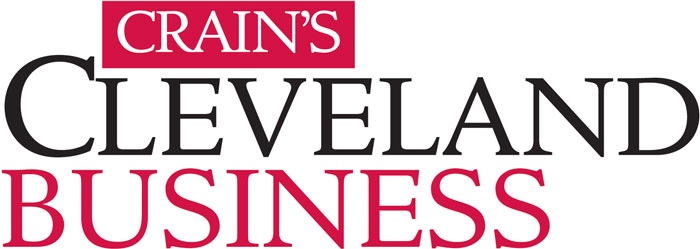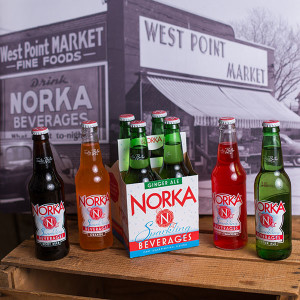
September 27, 2015
Selling Akron: Companies are building their businesses on civic pride
by Zachary Woznak
Local clothing businesses like The Social Dept. and Rubber City Clothing have hawked shirts featuring the battle cries and in-jokes of Akronites for a few years, but now two more companies are seeing the value of products that promote Akron pride.
Norka Sparkling Beverages, a revival of an Akron carbonated beverage brand that shut its doors in 1962, hit shelves in February. And the Knight Foundation awarded $52,000 to Unbox Akron, a monthly service that curates items from around Akron and ships them to subscribers. The service hopes to ship its first box next month.
These companies are doing more than just stamping “made in Akron” on their products. The products themselves promote the city.
Chris Horne, who won the Knight Cities Challenge grant for Unbox in April, started the service as an additional revenue stream and companion project to his magazine the Devil Strip. He said he doesn’t think a service like his could have existed 10 years ago.
“People have told me this is a radically different city,” said Horne, who moved to Akron from Macon, Ga., in 2013.
Unbox’s chief curator, Roger Riddle, said the city is “on an upturn.” He pointed to economic progress in Akron and the identity that neighborhoods like Highland Square have started to develop.
“There’s the opportunity for more small businesses to open up, more places for people to go,” Riddle said. “That’s the kind of stuff we really want to get involved with and help push along.”
Riddle said that environment is perfect for attracting the dedicated Akronites that Unbox needs to survive. The service aims to send subscribers items from Akron that encourage them to get involved in the community.
Riddle wants the first box to be a surprise, so he wouldn’t get into specifics about what’s inside. But he has spoken with area small businesses, artists and musicians about contributing to the project. The $35-per-month box will have roughly $70 worth of products in it.
Greg Kiskadden, who co-owns Rubber City Clothing with Keeven White, said companies like his and Unbox are experiencing “a snowball effect.” People have pride for their city, and the products are an outlet to express it. And having that outlet only enhances hometown pride, he said.
Rubber City’s High Street location stocks only Akron-related gear. The company started in 2004 as a project of four Firestone High School students. They sold the company to Ed Gaffney Jr. in 2006. Kiskadden and White, who head the marketing agency Whitespace Creative, purchased the store last year after recognizing the same upward momentum in the city that Riddle did.
“[The city’s] really kicked it up a notch in the last decade,” Kiskadden said. “I saw this Rubber City Clothing as a fledgling brand that had a loyal following and a great product.”
The Social Dept. founder Andy Taray called the shirts he screen-prints in his Akron home his “passion project.” Taray also sees the growth in Akron and credits that with helping businesses like his.
“Civic pride, ties to local growth,” Taray wrote in an email. “The more local and unique offerings a town or city have, the more people seek it out.”
But Michael Considine, who heads Norka Sparkling Beverages, doesn’t think his brand needed the same civic “upturn” that others did. Considine named older Akron companies — such as Swenson’s, Luigi’s and Thirsty Dog Brewing Co. — that have leveraged hometown pride to help grow their brands. He sees Norka adapting that tradition to craft soda.
The soda company’s rebirth started in April 2014, when Considine spotted the logo for the original Norka Sparkling Beverage in a mural at Canal Park. He had never heard of it. But now Considine sees Norka as a “vintage, iconic brand that had gone by the wayside,” and he is determined to bring it back.
Considine served as vice president of operations and finance for Twinsburg-based Solvi Acquisition LLC when the firm acquired a number of beverage companies, including Bawls Guarana and Crunk Energy Drink. He learned just how important brand equity was in the beverage industry.
“There is great value in a brand that identifies with consumers and establishes a loyal following,” Considine wrote in an email. “With Norka, there is such strong heritage to build on.”
Akronites and ex-pats
When Angela Roloff, general manager of Rubber City Clothing, joined the company in 2009, sales were moving slowly.
“We would go on for days when we wouldn’t sell anything,” Roloff said. “It was push, push, push.”
Since then, sales for the shirts have skyrocketed 223%, Kiskadden said. The company has seen its sales grow about 20% annually. In the year since White and Kiskadden took over, Rubber City saw a 23% sales growth.
Kiskadden attributes these huge numbers to the uptick in the Akron identity and the company’s increased promotion and marketing.
Rubber City sells most of its shirts out of its High Street store, where most customers are locals. It began online sales a few years ago, but traffic there has been slow. Its site might see a lot of purchases around the holidays, but Roloff estimated the website only makes up about 15% of total sales.
Others have found a way to adapt a local company to a national market. The Social Dept. makes shirts for most major cities and regions but still bills itself as a Midwest operation.
“Whether it’s business cards or on the website, we make it very apparent that we’re in what a lot of people would call ‘the middle of nowhere,’ ” Taray said.
And even though Norka is Akron spelled backwards, its appeal stretches beyond Northeast Ohio. Bottles are sold in five states, including California, where the craft soda craze is strong. By starting his company, Considine wanted to recreate that popularity in the Midwest.
Norka’s first and biggest Akron-area retailer is the West Point Market, and the drinks do well in Columbus, where supermarket display cases tell the story of an “Akron icon coming back to life.”
“People see it and they make the decision to buy local, support local,” Considine said. “That’s kind of been our strength so far.”
He estimated that about 70 percent of sales are in Ohio, with the remaining 30% coming from California, Indiana, Pennsylvania and Oklahoma. With only seven months of sales reports, Considine said the company is on track to sell between 5,000 and 6,000 24-bottle cases of the drink by the end of the year.
Taray admits that his products that tout bigger cities – say, New York or San Francisco – see bigger sales than those promoting Akron. The Social Dept. has no storefront — the company relies on online business and sales at both local and national trade and craft shows. That makes sales numbers harder to pinpoint, but he estimated that its website sells as many as 400 shirts overall a month when demand is high in the summer. He did not have Akron-specific numbers.
Taray explained that the growth of Akron’s identity is similar to bigger cities, just at a smaller scale. A more apt comparison, he said, might be thinking of Akron as similar to a neighborhood in a big city.
“I think Akron can strive to be that, to be a small city that offers owners and shoppers the ability to build up the pride together,” he said.
When Unbox Akron launches in a few weeks, its rollout will be cautious and calculated. Only 50 boxes will be shipped in the Akron area to a select list of recipients who have shown interest in the project.
Five or six months after what Riddle calls a “beta round,” he hopes to open up the service to the public. Live events and a quarterly “ex-patriot” box for former Akronites are also in the works.
“It’s not just a Groupon for Akron,” Riddle said. “It’s talking about the things that really make Akron special.”
And pride in what makes Akron special is the fuel for these local companies.

